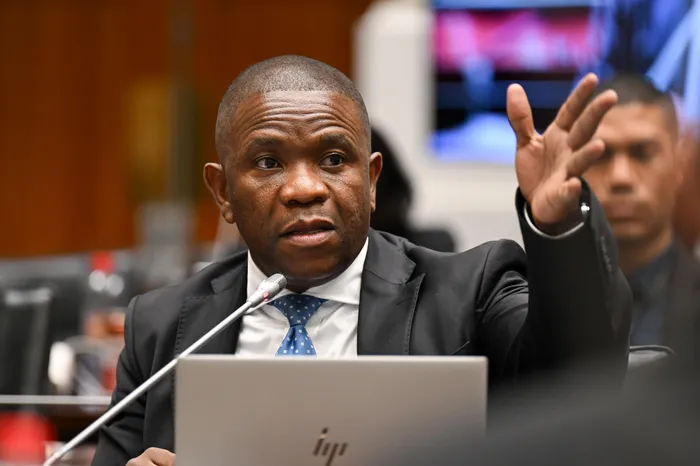
KZN police commissioner Nhlanhla Mkhwanazi during his testimony before the ad hoc committee.
Image: Henk Kruger / Independent Newspapers
THE chickens are coming home to roost. It started with controversial businessman Hangwani Maumela. Then followed General Shadrack Sibiya. One wonders… who’s next?
The Asset Forfeiture Unit is on a determined stride, and the nation watches with a mixture of suspense, amusement, and disbelief. Every day in the hearing room feels like a live broadcast of a national drama where the stakes are reputations, integrity, and sometimes, careers.
Step into the hearing room and you feel the weight of history pressing down. This is more than a legal exercise, it is a national mirror reflecting our collective character.
Familiar names enter with the confidence of seasoned veterans, only to falter under questions that demand more than rehearsed statements. Furrowed brows, long pauses, carefully constructed evasions it’s a national audition for accountability.
Too often, the performances fall flat, leaving the public with nothing but cynicism and the familiar taste of disappointment.
And then, during it all, stands General Nhlanhla Mkhwanazi. Calm, composed, and profoundly principled. In a room where obfuscation is a survival tactic, he has demonstrated the almost forgotten art of integrity.
No posturing. No theatrics. No selective memory conveniently aligned with convenience. He answers questions with clarity, provides a clear chronology of events, and brings a quiet moral authority that makes even the most seasoned politicians pause.
What makes his conduct extraordinary is not only its rarity but its significance. This Commission and indeed our nation requires more than spectacle; it requires witnesses who understand the moral gravity of their testimony.
South Africans have grown weary of scandals followed by inquiries that produce little tangible change. We have seen the cycle repeat: accusation, investigation, temporary outrage, and then back to business as usual. Mkhwanazi’s example interrupts that cycle. He reminds us that accountability is not a one-time event but a culture to be cultivated, protected, and embedded in every institution.
Accountability, he shows, is not merely a function of law; it is a matter of conscience. When leaders rise above self-interest and speak truthfully under scrutiny, they offer the nation more than testimony; they offer a moral compass.
In contrast to the evasions, postures, and occasional theatrical performances of others, General Mkhwanazi’s steadiness stands out not because it is flashy or dramatic, but because it is consistent, reasoned, and principled. He embodies the quiet strength that sustains public trust when it feels like the world is leaning toward cynicism.
The lessons here are profound. We cannot continue to rely solely on the courage of a few good men and women. Systems must be designed to demand integrity. Institutions must cultivate honesty, transparency, and accountability not sporadically, but as a standard operating procedure. Otherwise, the moral weight of governance will always rest on the shoulders of a few, and those shoulders, no matter how broad, are not infinite.
Yet, at this moment, we are fortunate. In an era where principled leadership is increasingly rare, we are blessed to witness it. We are blessed to have Mkhwanazi in our ranks, a reminder that leadership rooted in integrity is not a relic of the past but a living, breathing force that can shape the future.
He shows that power can be exercised with humility, that scrutiny can be met with courage, and that public trust, once earned through honesty and diligence, can be strengthened rather than eroded.
Let us not simply applaud him. Let us study him. Let us demand from all leaders the same courage, clarity, and unwavering commitment to principle. The renewal of our nation’s soul does not rest on the grand speeches or ceremonial gestures of governance. It rests on the quiet, persistent, principled acts of those willing to meet truth with integrity. And for now, General Mkhwanazi stands as a beacon in that effort, reminding us of what leadership can and must look like.
The chickens are here. The roosting has begun. And amid the clamour, General Mkhwanazi’s example shines, showing us that in the messy, often frustrating theatre of accountability, it is still possible to act rightly, speak truthfully, and emerge with both dignity and the public’s trust intact.
Qwesha is a trade finance consultant with expertise in global commerce and risk management and regularly contributes to a number of publications.